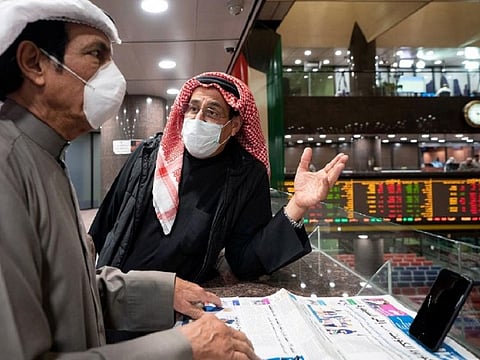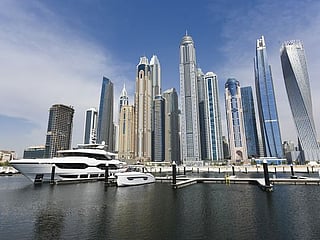Gulf pegs, Oman, Lebanon Mideast markets face rough quarter
Debt sales from the region hit a record in the past quarter

Also In This Package
Dubai: From parliamentary gridlock in Kuwait to paralyzed debt talks in Lebanon and giddy valuations for Saudi Arabian stocks, investors in the Middle East face a raft of risks in the fourth quarter.
Ever-present is the fact that current crude prices can’t balance the budgets of most of the region’s energy exporters.
Here are six risks to watch in the last three months of the year:
Oil blow
While derivative traders have pared bets that Gulf states will be forced to devalue their currency pegs in the next 12 months, bouts of volatility may return.
Countries that have been financing deficits through debt sales “may be in trouble if oil prices persist at current levels,” said Peter Kisler, a London-based portfolio manager at hedge fund North Asset Management. “2020 is an exceptional year, and they can get away with it now, but I am not sure they have a viable long-term plan if oil prices don’t return to pre-2020 levels.”
Debt sales from the region hit a record in the past quarter as governments rushed to place bonds after the coronavirus shock.
Looking dear
In equity markets, most Gulf Arab nations have outperformed their emerging peers in the last three months. What’s shaping up to be their worst recession on record could leave them exposed.
“Stock-market valuations, for example in Saudi Arabia, remain elevated and somewhat detached from the underlying economic prospects,” said Tarek Fadlallah, the Dubai-based chief executive officer of the Middle East unit of Nomura Asset Management.
Debt test
Oman is planning its first Eurobond sale in more than a year, despite the threat its credit ratings could slide deeper into junk.
“The biggest concern in Oman is that it fails to deliver convincing fiscal reform, which would undermine its debt-market access at a time of exceptionally large funding needs,” said Jan Friederich, a Hong Kong-based senior director with Fitch.
Oman also lacks a backstop credit line from its regional allies. Spreads on some of the sultanate’s securities have stabilized after briefly surpassing 1,000 basis points versus U.S. Treasuries, a threshold for debt to be considered “distressed,” in the first half of the year.
Other countries in the region that have a negative outlook on their ratings include Iraq, Jordan and Morocco.
Gloomy debut
Kuwait joins the MSCI Emerging Markets Index in November under a cloud of uncertainty.
Parliamentary opposition to a law that would allow the government to borrow has prevented it from raising debt, even as it faces the highest budget deficit in its history. Sheikh Nawaf Al-Ahmed Al-Jaber Al-Sabah, 83, was sworn in Wednesday as the ruling emir, following the death of his half brother. The nation also holds parliamentary elections later this year.
“Kuwait will have to contend with uncertainty around its election, succession concerns, expensive valuations and the inevitable hangover once the index inflows related to the emerging-market upgrade recede,” said Hasnain Malik, the Dubai-based head of equity strategy at Tellimer.
On Hold
Lebanon’s inability to form a new government has pushed back the prospect of a deal to restructure the country’s debt after the nation defaulted on about $30 billion of Eurobonds in March. Its debt was the worst-performer in emerging markets in the third quarter.
“Progress with debt restructuring will require greater unity among political and economic elites, the prospects for which remain very uncertain despite the severe deterioration in economic conditions and the conditional help on offer from international institutions,” said Friederich at Fitch.
Biden, Iran
Since taking office, U.S. President Donald Trump has sought to build a unified coalition in the region against Iran. Accords establishing diplomatic relations with Israel and the United Arab Emirates and Bahrain have done little to boost markets, but the potential geopolitical impact could unnerve investors.
“The outcome of the election will matter with regards to policy towards Iran and a potential weakening of the Trump administration’s strong support for the region in light of a Biden victory,” said Mohammed Elmi, a London-based emerging-market portfolio manager at Federated Hermes, which manages almost $630 billion.
Sign up for the Daily Briefing
Get the latest news and updates straight to your inbox







